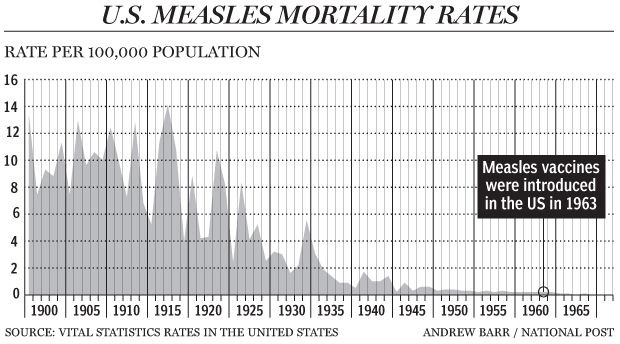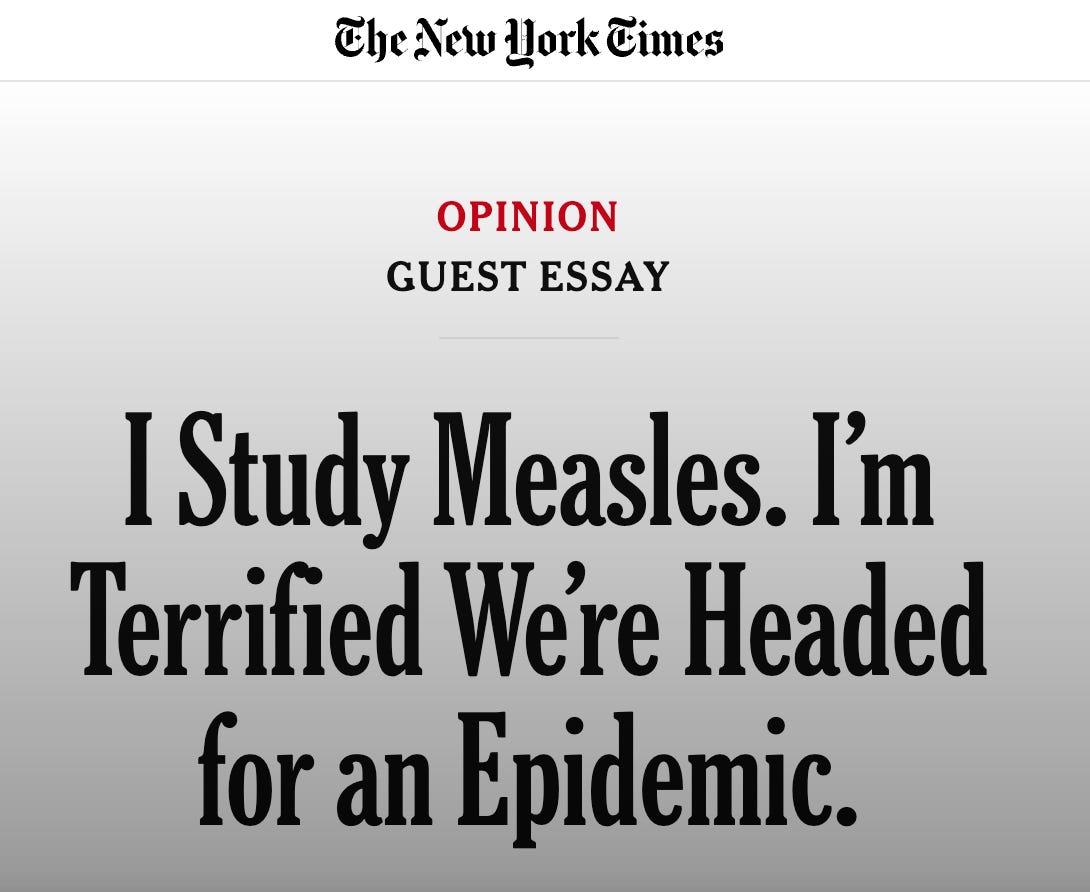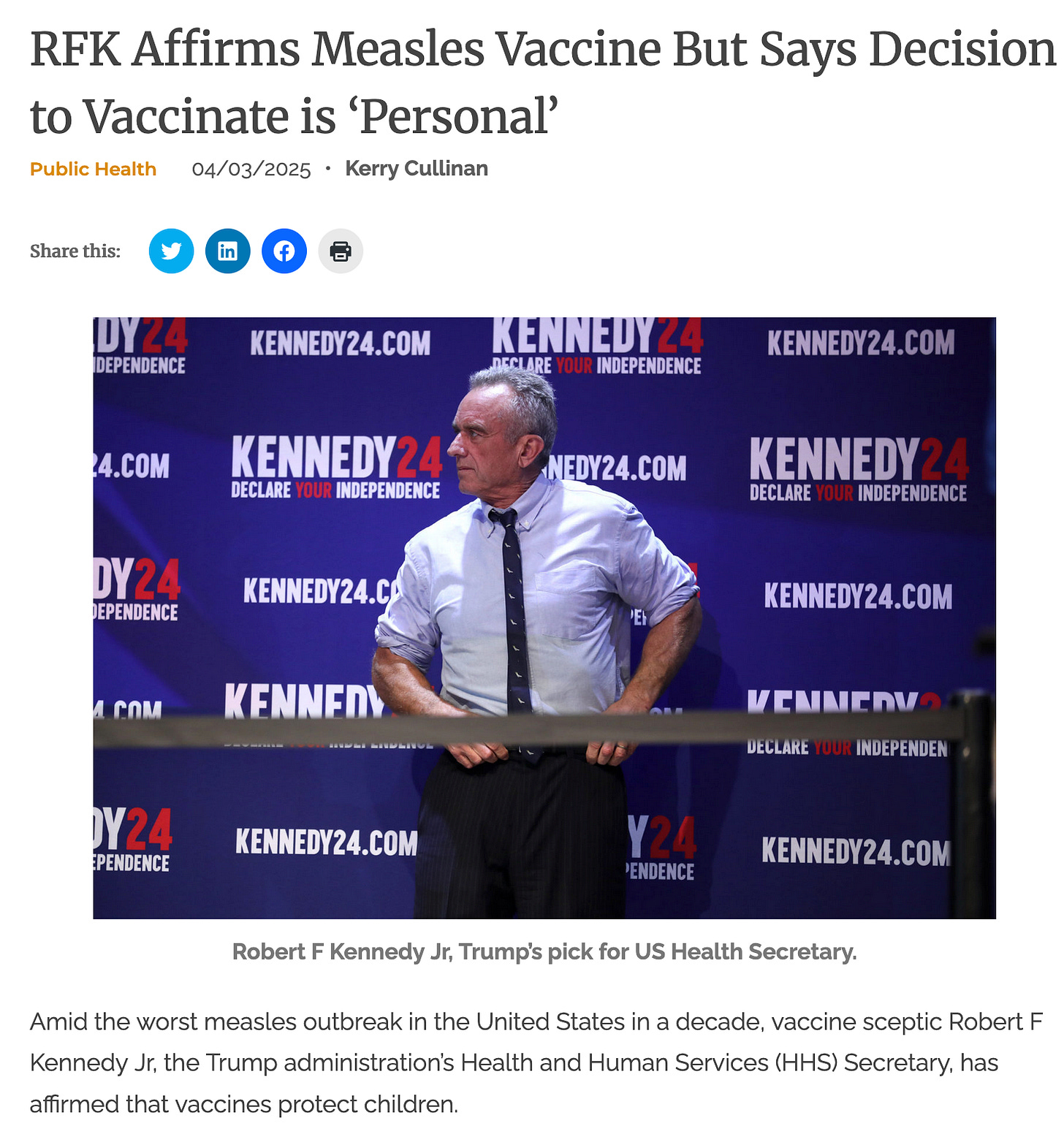Measles - a rite of passage
She doesn’t look it, but Julie is the senior partner here at the Pairodocs. She is just old enough to have missed out on being measles vaccinated as a child, and thus was afflicted with the now-dreaded disease—as was essentially every other kid her age. Despite the ubiquity of measles back then, Julie doesn’t recall any of her friends or schoolmates dying or being seriously ill due to measles.
Parents in the 1960’s were not terrified of measles like parents of today. In fact, since it was recognized that measles was milder if contracted at a younger age, measles “parties” were not uncommon. Kids were sent to spend time with measle-y friends in the hope that they would catch it and “get it over with”. Yes, parents WANTED their kids to catch measles.
For those of us who are old enough, real-life experience helps us keep measles in perspective. But it must be hard for younger people to have a balanced view of measles in the face of intense government/public health/media messaging that insists that measles is a serious and frightening disease. The idea of a child contracting measles now strikes terror into the hearts of parents, a fear that is weaponized by public health to cure “vaccine hesitancy”.
There is an analogy here with COVID, where it turned out that the best cure for the panic around it was actually having it or seeing someone who had it, and seeing with your own eyes that for the vast majority of people (and especially kids), it was just a cold. Once COVID finally arrived in our area, personal experience largely cured the institutionalized panic that had been created by the public health establishment.
I highly recommend taking a minute to watch this video, which gives a great sense of how we thought about measles (not to mention chicken pox, whooping cough and more) back when it was common.
So just how bad IS measles?
I certainly wouldn’t suggest that no child - ever, anywhere - got terribly sick or died of measles. Measles can cause encephalitis in some cases, and many kids were miserably ill from it. But contrary to public health messaging, it had stopped being a major killer of children LONG before vaccination became standard.
Like all other childhood diseases, the fall in death rates occurred long before vaccination and was due to a combination of factors. The economic miracle that was the 1900’s massively reduced the number of people living in poverty, and thus allowed them to afford better nutrition, which in turn led to better immune function. We developed central heating and greatly improved sanitation. And finally, there was better access to medical care for those who did become ill. These factors, and more, meant that by 1960 the mortality rate for measles in the USA had decreased to 1 in 500,000. But even then, public health felt it was necessary to portray measles as a serious and threatening disease in order to sway parents to vaccinate their children (click on the above link for the full reference).
Parsing the 1 in 500,000 number further, it is safe to presume that the unfortunate one in 500,000 was more likely a child with comorbidities, meaning that the odds of a healthy child dying of measles was even less. I have asked a number of older folks if they knew anyone who died of measles, and the answer over and over was “no”, although many can tell you about being miserably ill with the measles.
In contrast, almost everyone knows of a family member or friend’s family member who died in a car accident. The yearly risk of a child dying in a car accident is about 1 in 20,000 (varying by exact age group, as teens are at much higher risk once they start to drive themselves). You may notice that 1 in 20,000 is much higher odds than 1 in 500,000. And, unlike measles, you are not immune to future car accidents by virtue of having one. Yet we don’t panic about driving to see grandma, nor does public health try to terrify us into staying home rather than driving ourselves somewhere (at least not yet).
Low-risk diseases demand low-risk treatments
El Gato Malo is correct. No treatment should ever be recommended that has more risks than benefits. And so the more benign a disease is, the more demonstrably safe a treatment has to be before it should be recommended. If you have a deadly cancer that is 100% likely to kill you, taking chemo or having a surgery with a 50% mortality rate might be very reasonable. Whereas when treating a headache, prescribing a painkiller with a 50% mortality rate is entirely unacceptable. Because measles is not a highly dangerous disease, it behooves the medical profession to prove -to the satisfaction of parents who are considering vaccination - that the vaccine is VERY safe. For more benign diseases, more subjects need to be studied over longer periods of time to prove the efficacy and safety of any treatment, as compared to studying treatments for deadly diseases. Large, long trials are very expensive, and thus rarely funded.
Measles is used as a club to beat “anti-vaxxers”
Holy honkin’ has the public understanding of the risk of measles changed since The Brady Bunch was on the air. Mainstream media is rife with stories of the danger of measles, “outbreaks”, and looming epidemics. Even alternative media is caught in the measles-is-a-major-threat mindset. Let me go through one example.
I have great respect for what Bari Weiss has done in setting up The Free Press. Although I sometimes disagree with her politics, she does many great interviews (and has great people working for her (like FSIM 2023 speaker Rupa Subramanya).
Recently, she interviewed incoming NIH director Jay Bhattacharya (FSIM 2022 keynote speaker, and one of my favourite human beings). The interview was marred, in my opinion, by her repeated insistence that the fall in vaccination rates - including for measles - was a disaster. Sure, she said, it makes perfect sense that we have lost respect for the authority of public health to dictate to us due to the debacle of COVID. But, in her opinion, some parents take this too far by putting their children, and others, at risk by not vaccinating for measles (and other diseases).
Is it even OK for scientists to discuss these questions publicly, she wonders? Because if they do, one thing leads to another, and “the next thing, measles is back”. She suggests, although avoids saying directly, that RFK is creating “vaccine hesitancy”, and wonders aloud whether by even allowing more vaccine studies, Jay will cause more harm than good simply by entertaining the idea that more study is even NEEDED. For her, the matter is settled. “Children not getting the COVID vaccine, not a big deal. Children not getting the MMR vaccine, EXTREMELY big deal.” she says.
Poor Ms. Weiss. You can take the girl out of the NY Times, but you can’t take the NY Times out of the girl.
It is understandable why people who still listen to MSM for “information”, or still trust public health “experts”, as does Ms. Weiss, are terrified of measles. For them the disease is a deadly killer, stalking children and ready to pounce unless enough people get vaccinated to keep it permanently at bay. Cases are up this year, so run out and get your vaccines updated. Not vaccinating your kid for measles, for those who think like Ms. Weiss, is as irresponsible as sitting them on the roof of your car and driving on the highway. Why would you take the chance?! You plebs are not taking this seriously enough!! Therefore we - public health - must take this fear-of-measles stick and beat all the vaccine hesitancy right out of you!
Let’s look at the numbers
So how serious is this “outbreak”? Are kids dropping dead regularly in the USA?
First, it’s important to note that “outbreak” is relative. Although cases are up from last year, they are far from the peak in 2019, and hardly even make a blip when you widen your lens back to the 80’s.
The exaggerated threat of measles is used to push vaccines
The “education” that we doctors get around measles vaccination is not about risk-benefit ratios. It’s not about potential adverse effects, or the likelihood of benefit, or the history of measles mortality. In fact, I doubt any physician you speak with could come even close to guessing the mortality rate of measles infection.
The information we receive tells us how to “overcome vaccine hesitancy” and “address misinformation”. That measles is a serious killer and therefore must be vaccinated against is assumed to be true. And because measles is such a killer, questioning vaccine efficacy or safety is heresy. Even writing this Substack puts my license at risk (again).
Crisis of Faith in “Experts”, or a Renaissance of Personal Agency?
Unlike Ms. Weiss, I am actually very happy that - under RFK - the scientific establishment will be backing up the bus and looking much more carefully at the risks and benefits of vaccines. (As an aside, I have had the pleasure of speaking with RFK when he interviewed me on his podcast a few years ago)
Far from being a disaster, I consider the questioning of public health since COVID to be a renaissance of sorts - a great awakening. Not everything public health says is wrong, and automatically going north when they advise going south is not sound decision-making policy. But COVID taught us that thinking for oneself is important. So I’m glad more people are doing it. This includes taking the time to understand the actual risks of the diseases that we can vaccinate for.
As long as you have put some thought into the decision, you have my respect whether you choose to vaccinate or not. But this decision should be based on facts, not irrational fear instilled by public health propaganda.
I don’t pretend to know the answer to whether vaccines cause more harm than good or vice-versa, or what the outcome of more research might be. But I’m old enough to remember a time when we laughed at measles and chicken pox, and sent our kids to parties to catch them. Thus I am skeptical of the panicked messages from “experts” about “epidemics”, the vilifying of “anti-vaxxers”, and (until RFK and DOGE) the incredible amounts of public money - OUR tax dollars - being spent to terrify us into vaccinating our kids and ourselves. I agree with RFK - vaccination should be a personal decision. Good luck with yours.













I caught measles at age 13 or 14 in about 1977/78. I got pretty sick, I was out of school for several weeks and mostly in bed and had a high fever and was pretty sick, BUT it no one was especially super concerned, and I recovered fully. I don't get the current panics, although you explain it all well.
back when the Wakefield autism issue arose, I don't know what was happening here but in UK many parents decided to go down the road of using single vaccines as they had not lost trust yet in vaccines but did not trust the PH reassurance that sticking as many vaccines as you could in one needle was entirely without risk. Great efforts were made by many parents to get individual jabs privately. So PH, who believed individual vaccines increased risk of incomplete course arranged for gubmint to remove the product licences of the individual vaccines which removed their availability, and dragged Dr Wakefield before the GMC. PH demand we all trust the (wo)man from the ministry and will act in any way to achieve their aims, with fear psyops, reputational assault, exaggerations and lies now major tools....and always refusal to accept vaccine damage.